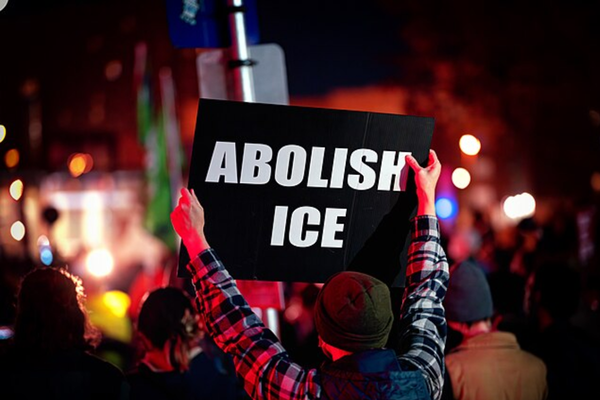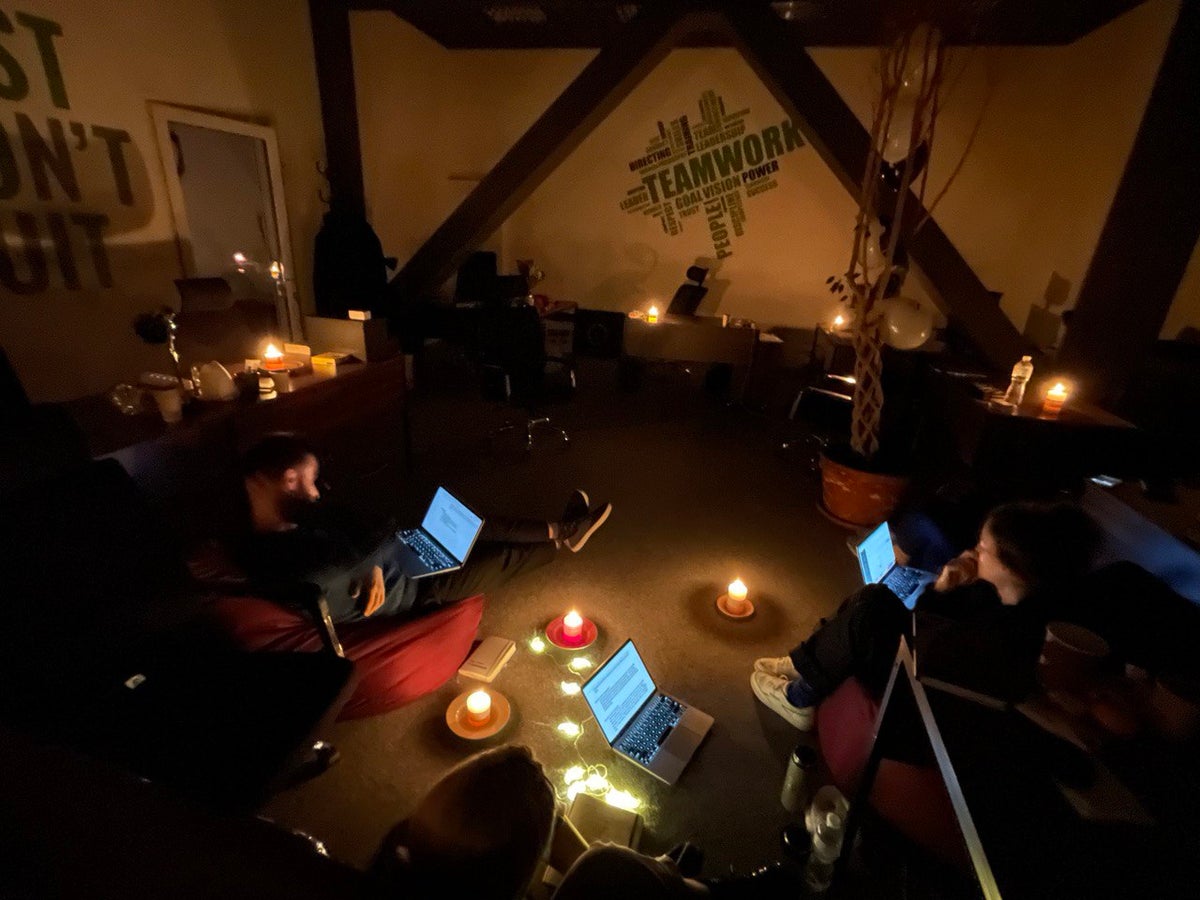
Olga Rudenko never thought her team of journalists would be reporting on a second year of Russia’s war on Ukraine.
“In the first few months of the invasion I’d have been surprised if someone told me it would last a year or longer,” says the editor-in-chief of The Kyiv Independent.
“For a good chunk of time I believed it would end soon – just because of how horrible everything was that was happening. When you’re in the middle of all that, it’s too horrible and big to think it will happen for a long time.
“You think, ‘Surely the world will stop this’... but here we are.”
A lot has changed in a year for the team at The Kyiv Independent.
Speaking from the new Kyiv newsroom on 20 February – the same day US president Joe Biden made a historic visit to the city and four days before the one-year anniversary of Russia’s invasion – Ms Rudenko says it’s been only a few hours since the last air raid alert rang out in the skies overhead.
It’s also been only around two weeks since the latest power outage plunged the newsroom into darkness.
Reporting news of the war’s atrocities by candlelight or battery power packs became the norm a long time ago due to Russia’s relentless attacks on Ukrainian infrastructure.
It’s all part of what Ms Rudenko has now come to realise is “the new normal”.
“This isn’t something that’s going to end anytime soon,” she says.
“A few months back we all realised that this is just how we live now.”
It’s a world away from life before 24 February 2022 – the day Russian president Vladimir Putin declared war on Ukraine – when the months-old paper was still in start-up mode.
But it’s also a long way from the last time The Independent spoke to the Ukrainian paper’s editor-in-chief.
The early days of war
Back then, it was early March 2022 – around two weeks after Russia declared war – and Ms Rudenko was hunkered down in an undisclosed location in western Ukraine.
She and the vast majority of her team of journalists had evacuated from Kyiv the day the war began, relocating to safer areas across the country.
At that time, Kyiv was being bombarded by Russian forces, and Western allies feared the capital could fall to Vladimir Putin within a matter of days.
The lives of journalists were especially at risk if they fell into Russian hands, with Mr Putin censoring independent media on Russian soil and his troops targeting members of the media in Ukraine. (In 2022, at least 15 journalists were killed in Ukraine, according to the press watchdog Committee to Protect Journalists. Like most official figures recording the war’s fatalities, the true number is likely far greater.)
But, beyond concerns for their own personal safety, there was also the risk of Kyiv’s internet connection and electricity being compromised by Russian attacks – cutting off the power The Kyiv Independent team needed to inform the world about the atrocities happening on the ground.
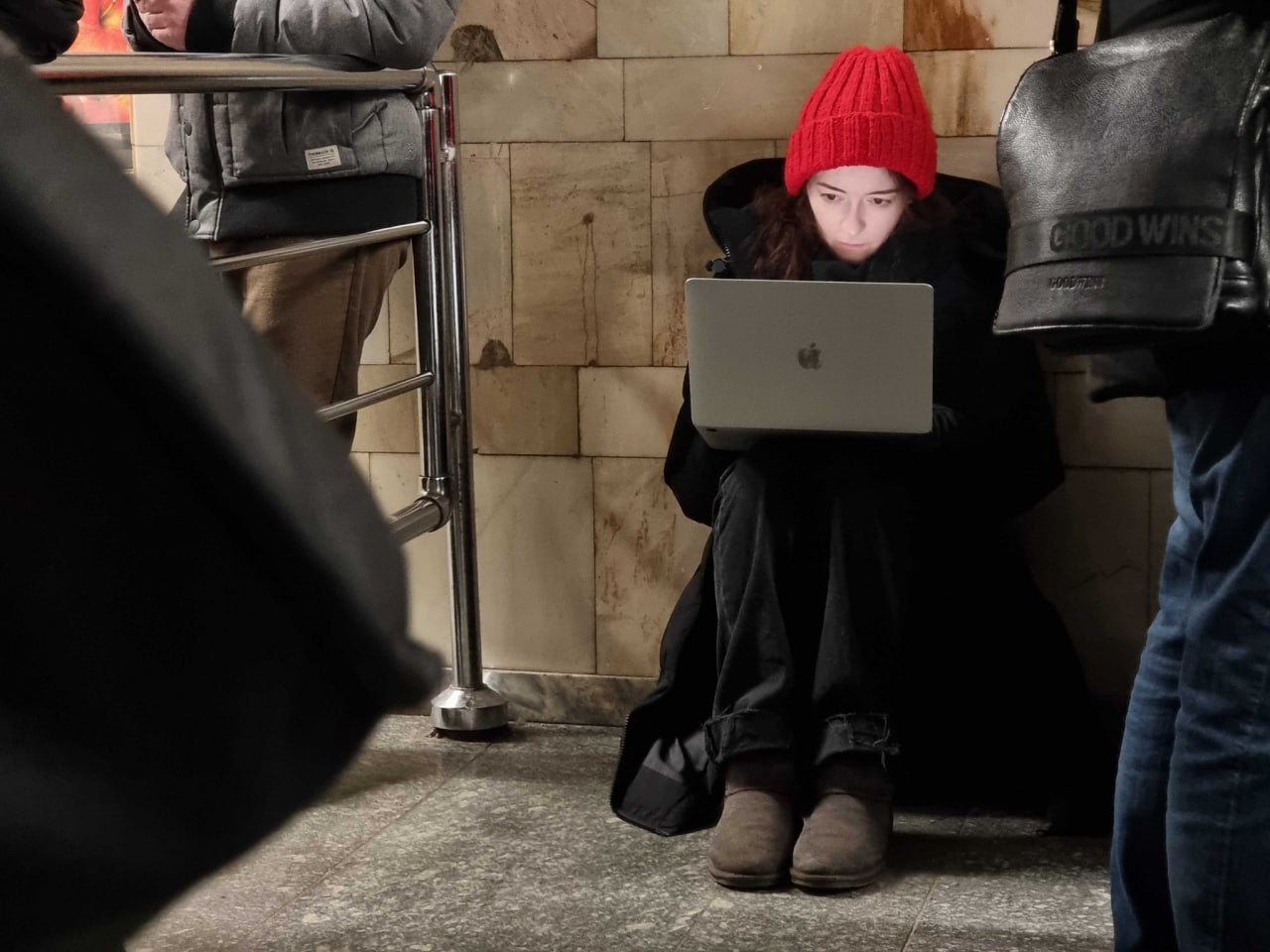
“February 23 [2022] we were all working in the office. Then February 24 we were all headed to where we were going. There was no time for a goodbye,” Ms Rudenko says.
“When I left on the evening of February 24, I remember standing at the railway station and looking around me, thinking maybe this will be the last time I ever see Kyiv. That maybe I was bidding farewell to my home.”
One year on
Now, 12 months on, almost every member of The Kyiv Independent editorial team has since returned to the Ukrainian capital.
Ms Rudenko was first to return in early April – less than two months into the war.
“I couldn’t wait to come back,” she says.
“That month away from Kyiv was the hardest thing for me. I decided that I would rather be in Kyiv and be in more danger than not be here.
“I had the urge to jump on a train every night that I was away. I felt, why is my city going through this and I’m not there?”
In early April, Ukrainian forces had pushed Russian troops back around Kyiv, retaking control of areas around the capital and lowering the risk of attacks on power systems.
At that point, Ms Rudenko decided it was time to come back.
She returned to an empty Kyiv – and an empty newsroom.
“It was an eerie place... I just remember Kyiv was very quiet and empty but also very sunny,” she says.
“I remember being ecstatically happy to be back in Kyiv. I don’t know if I’ve ever been so happy to be there... it was quite amazing. Even though the city wasn’t safe, I felt such immense happiness to be home and to know my home and city were still there.”
In those first weeks back, it was just her and the three on-the-ground war reporters who had voluntarily stayed behind from the get-go.
Over the coming weeks, more and more of the team followed.
“Our normal life before the war had ended so abruptly,” she says.
“So meeting together again months later, it felt like we had gone through something very significant together and were coming out the other end of it.”
There were points over the summer of 2022 where she says there was even a semblance of pre-war life.
The newsroom was busy again.
Friends would meet for drinks on the evening (making sure to be home on time for curfew).
Sometimes a week would go by without a single air raid.
But there was no escaping the fact that they were now living and working in a warzone.

A new normal
In October, Russia launched a fresh campaign of mass missile attacks, targeting Ukrainian power stations and infrastructure, shutting off electricity, heating and water to parts of the country.
Around then, it hit home for the team that the war was far from over, says Ms Rudenko.
“We’re still not past the hardest part of it. It’s something that is going on and going to go on into the future,” she says, adding that they all try to grasp “moments of normality” when they can.
“A shift started to happen in our minds, realising that this is our new lives, that this is not temporary.”
One of the team members is also a year into fighting for Ukraine on the frontline.
Back in February 2022, Artue Korniienko was a culture reporter – with one of his last articles on the website rounding up “picks of the best art, music, film and more in the capital” over the weekend of 18-20 February 2022.
Now he is a volunteer fighter on the frontline somewhere in eastern Ukraine.
“We are of course very worried about him. We still consider him part of the team and it’s an honour to have somebody on our team,” she says.
Recently the newsroom sent him a care package including a sweatshirt with The Kyiv Independent logo on it.
Reporting by candlelight
During those winter months when attacks on the power grids ramped up, the “new normal” meant adapting to working in the cold and the dark.
While the team spent time preparing for outages, high demand for battery-powered lamps and power banks had led to shortages.
“Some weeks at the beginning, we had to use candles as everyone was hunting for lamps and power banks so there was a shortage. For many weeks we had a very romantic atmosphere in the office,” Ms Rudenko laughs.
At its worst, the newsroom would only have electricity for about three or four hours a day.
During the longest blackout – where the whole of Kyiv was without power for more than 30 hours across two cold November days – she says they “safeguarded the office” so that there was no disruption in news coverage.
At the end of a day’s work, the team members would then return home to no water or heating.
As well as stocking up on power banks, large battery packs and a heating device for the office, the newsroom also managed to get a Starlink – Elon Musk’s satellite internet system – ensuring they can stay online.
In recent months it’s become normal for at least one two- or three-hour power outages every single day. The past two weeks have been something of an exception after the electricity grid was repaired from missile attacks.
While the team has proven “resilient” and adapted to the unpredictable situations thrown their way, Ms Rudenko also credits the support of The Kyiv Independent’s Patreon community – more than 10,000 readers who donate from $5 (£4) a month to help support the paper and ensure it can continue its crucial work.
“In those months where Russia was bombarding Ukraine trying to shut down the power grid, that was extremely helpful,” she says.
“After the start of the invasion, we gained a big following and now thanks to our readers we have the resources to make our work here possible.”
The Kyiv Independent was only in its infancy when the war began.
It had been launched just three months earlier in November 2021 when a group of journalists were fired from The Kyiv Post, Ukraine’s long-running and now defunct English language paper, over a conflict with the owner’s direction for the brand, which the editorial team said infringed on its editorial independence.
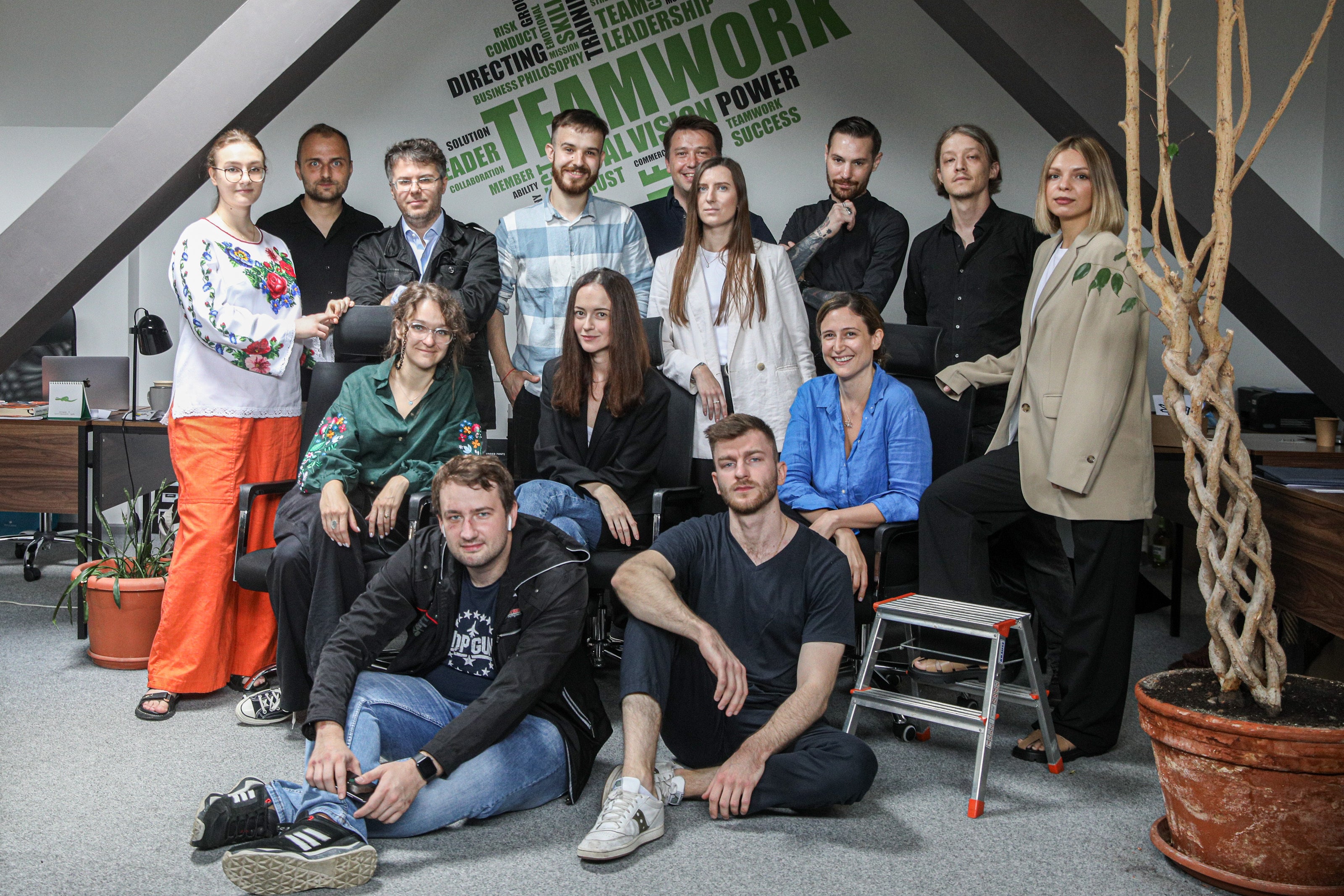
That month, the group of journalists together launched The Kyiv Independent and Ms Rudenko was picked by the staff to be its editor-in-chief.
Three months later, the paper leaped from being a small start-up to one of the leading authorities on the reality of the war on the ground in Ukraine.
In just two weeks, its readership skyrocketed and the company’s Twitter page soared from 30,000 followers on 21 February to 1.7 million as of 9 March.
Now, it has topped 2.1 million.
The team of around 20 all became “war reporters” overnight, with other beats put on hold at the time.
‘Journalism in Ukraine is bouncing back’
One year on, Ms Rudenko says that a “shift has now happened” where journalism in Ukraine is on the rebound.
“Journalism in Ukraine is bouncing back,” she says.
“We are all working on the war but in the last few months there has been a shift in a sense that, for most of last year, the war was the only thing that existed.
“Then, a few months ago a shift happened where journalists – and not just us but other journalists in Ukraine – started paying attention to other topics.”
Among those topics is corruption – including an investigative report into the alleged abuse of power of leadership in parts of the International Legion of Territorial Defence of Ukraine.
“Things started to become more normal like holding people accountable, which had been on pause as we were so focused on Russia and Russian war crimes,” she says.
But the shift is something not everyone feels is appropriate at this time.
“Some say things like corruption should be on pause until the war is over as it doesn’t present Ukraine in the best light,” says Ms Rudenko.
“But at The Kyiv Independent, we think that things like that cannot be put on hold. It’s hurting Ukraine and we can’t just brush it under the rug and hope it goes away.”
Of course, reporting on the war does continue to dominate the newsroom.
Some of the stories Ms Rudenko feels most proud of her team for over the past year are the more human stories on the ground.
“Stories of human suffering don’t get as much attention anymore,” she says.
“It may not be the stories that get you a lot of page views anymore but they’re important we keep doing.”
Documenting history
Ms Rudenko feels that these more human accounts will be crucial sometime down the line when the war is over and the history books are written and lessons are learned for the future.
“It’s like writing a fresh chapter of history while the memories are fresh. Years will pass and time will pass and we need a lot of this to be recorded and documented so that it is remembered,” she says.
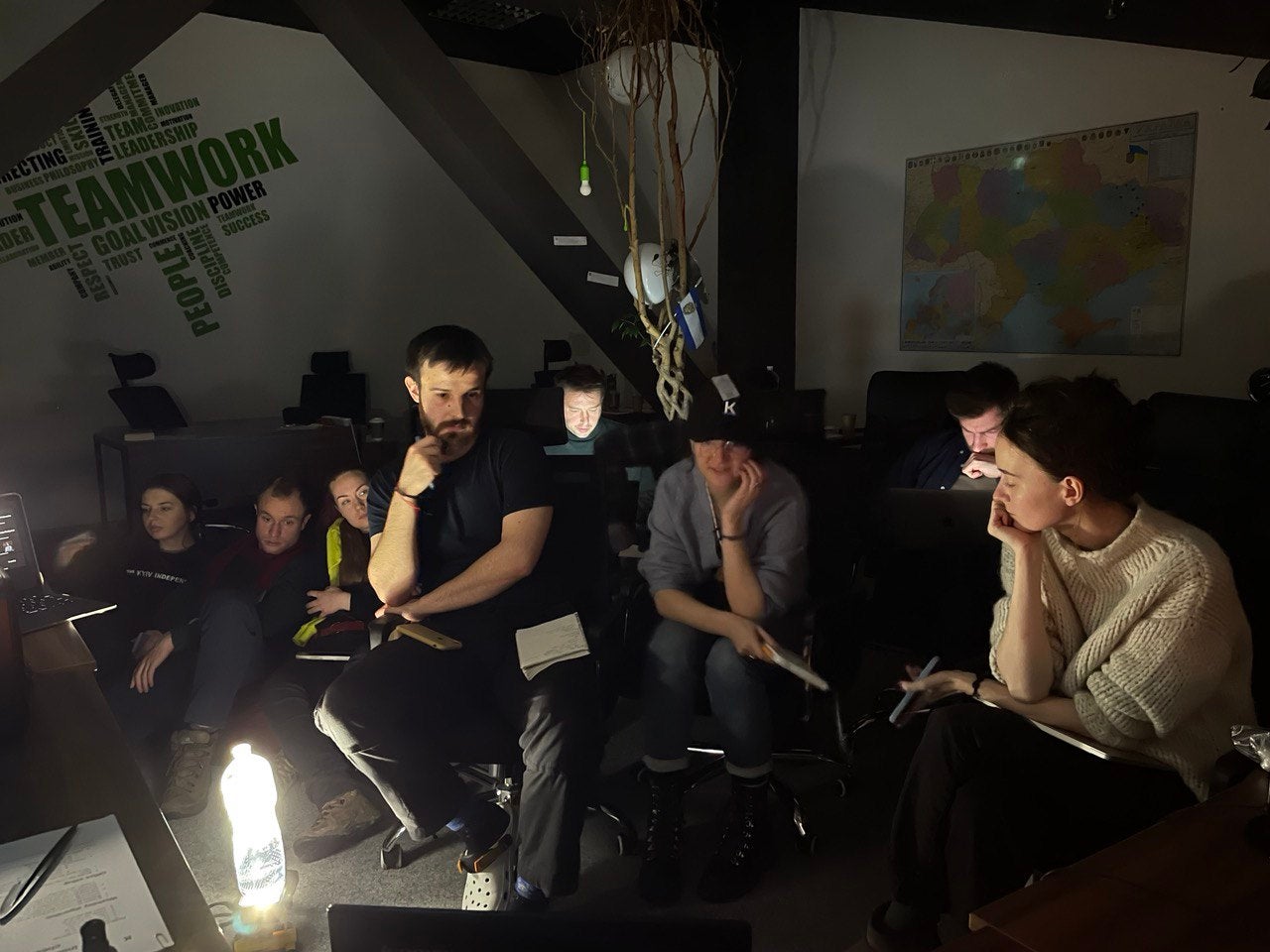
“It’s really important to document – not for the sake of page views or because there’s a big headline – because by documenting it, you’re making the first step to ensuring that this will not be repeated.
“Sometime in the future, there will be reflection on how horrible this was and there will be a need to change the world order to make sure it doesn’t happen again.”
As the war enters its second year, Ms Rudenko feels this is especially important amid concerns that the public – and the media – outside of Ukraine will move on to the next story.
“I’m worried the world will look in a different direction and get tired of the war. It worries me because I don’t want the world to just accept that the war is now in its second year and that it could last for many more years.
“So we see it as part of our mission to keep the world talking about Ukraine by giving them news, stories and finding new ways to talk to the world about the war,” she says.
“It’s a horrible story and it’s been the same story for a year so how do you keep telling it in a way that people still read it?”
Story one or story two?
For Ms Rudenko, the anniversary is not only a “horrible” reminder that the war has now gone on for one year – it’s a fearful warning that there may be more anniversaries down the line.
“I want the world to know there doesn’t have to be another anniversary of this war,” she says.
On 24 February 2024, journalists at The Kyiv Independent could be reporting on the latest civilian and military deaths at the hands of Russian forces and the latest homes reduced to rubble.
Or the newsroom could be telling the world how Ukraine is rebuilding its communities and how the Ukrainian people are rebuilding their lives after the war has ended.
“In a year from now, we could be celebrating that the war is over and that the global community did the right thing by ending the nightmare. We could hopefully be taking lessons from it. And we could be talking about the rebuilding of Ukraine – of homes, of people getting resettled and of life going back to normal,” she says.
“But the other option is we mark another anniversary of the war, that we enter our third year of war. That would be extremely sad and would mean that we as a global community have failed to end the nightmare and end the human suffering.”
She adds: “It’s less up to Ukraine but more up to our Western allies to decide which story we will be telling a year from now. So will it be story one or story two?”



